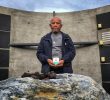Back to the point of departure
In his latest column for the New Statesman, John Pilger reflects on the idea of a journey, and wonders, like TS Eliot, if the point of travelling is also to find out where you came from. However, the unsuspected and tragic can change everything.
TS Eliot wrote that the point of any journey was to find out where you came from. As I bore my bulging canvas bag to the wharf at Circular Quay, not far from where my Irish great-great-grandparents had landed in leg irons, I hoped the point of my journey would become clearer once my ship had sailed. The Bretagne was my ship; it was white with blue stripes along the side and had a graceful bow, having been built in Saint-Nazaire as a modest version of the mighty Normandie. Alas, long veins of rust showed, and the crew looked morose. A Greek company now owned it, and the previous day had decanted 600 Greek brides.
The brides had been married �by proxy� in Greece to men in Australia they had never met. It worked this way. Young Greek (and Italian) men emigrated to Australia in the postwar years to work in the outback or at night in factories. When the authorities realised an entire gender was missing, they encouraged young women in Greece to write to their bereft male compatriots on the other side of the world. This often resulted in a wedding with the groom present only in a photograph pinned to the wedding cake. When a bride ship docked, anxious men and women would hold up photographs to identify the wife or husband they had never laid eyes on. Unfortunately, some hearts would change during the month-long voyage, producing a certain anarchy on arrival.
My Australian generation filled these ships on the return voyage to Europe, squeezing into six-berth cabins below the Plimsoll line in order to reach that mystical place called OT (�over there�). On the wharf that May day, aged 22, I told my mother I would be back in a year or two. �You won’t be back,� she said. With departure delayed 12 hours because Captain Nick was missing, we sang our umpteenth �Auld Lang Syne�, and the beer and tears ran dry; and finally we steamed out into the Pacific. I thought I could see my father’s silhouette on the headland; someone flashed their headlights.
I have read about fellow expatriates who insist that, from a tender age, they longed for cultural betterment elsewhere. Clive James comes to mind. As the bride ship slid into its first trough of green ocean, and salt spray cascaded over those of us still looking back, I was smitten with what I thought was seasickness but was really homesickness; rather like some tropical maladies, it recurs all your life and there is no cure.
Having made it to Singapore, Captain Nick missed, perhaps literally, the next port (Colombo) for reasons unexplained. As we crossed the Indian Ocean, with fresh water rationed for reasons unexplained, the horizon became a see-sawing line etched in my vision. The tiny, always empty dance floor remained at an angle and the Italian band were to be found at the rails, lime-green of pallor. Affordable alcohol ran dry for reasons unexplained, with the exception of sweet vermouth. Entertainment was provided by a fight between a Greek officer, known as Matinee Idol, and a New Zealander who had thrown him into the ship’s minuscule pool when we crossed the Equator. I interviewed a sheepshearer who was going home to Greece. When the interview was published, the headline asked, �Is this the shortest shearer in Australia?�
Then, one morning, there were red cliffs and, beyond, the Suez Canal. At Aden, I paid �12 for a Hermes Baby typewriter, which accompanied me to places of upheaval for 30 years, minus only the letter �m�. When we landed at Genoa, I fell to the ground. Two years later, the bride ship blew up without loss of life, for reasons unexplained.
The journey taught me how immense the world is, and I remain in awe at the sheer magic of a flight that covers the same 13,000 miles in a day and a night. That said, when the pilot flying a cargo of rifles, ammunition, stockfish and me into the Biafran War at night bellowed, as we approached the ghostly outline of a dirt road littered with the wreckage of aircraft, �Turn the fucking lights on, so I know where to put this thing!�, I was also in awe at my own fragility and fear. Mind you, the art deco piano bar flying across the United States was no less surreal. You can take a shower on the new Airbus A380, after your massage. The magic has become routine, as if the epic scale of things no longer applies.
That is not quite true, and the trigger for these reflections is a poignant story of a journey that was on the front pages recently, but briefly, having now succumbed to Gordon Brown’s perennial crisis and the venality of his associates. Yet it lingers on. A backpack and a vaccination card were found, and a laptop, and there was a photograph on the web of a container holding the few bodies found floating where Flight AF447 went down on 1 June.
I have flown by Air France from Paris to Rio, the fatal route in reverse, and I remember the place where the trade winds collide and the ocean is sucked into the sky and becomes a vortex of a kind. My aircraft then – a Boeing 707 – rose and fell, rose and fell. The fake starlight window in the ceiling provided reassurance.
The news of Flight AF447 is now all but forgotten. I read a dignified statement by Jane and Robin Bjoroy, the parents of Alexander, aged 11, who had visited them during his half-term holiday and was on his way back to school in Bristol on AF447. They said their son’s death was tragic. It certainly was that, and perhaps a reminder of the epic scale of things. (25 June 2009, johnpilger.com posted by Davao Today)










